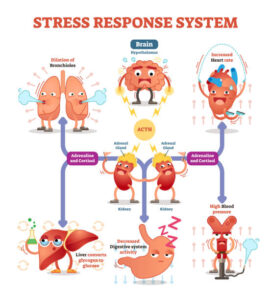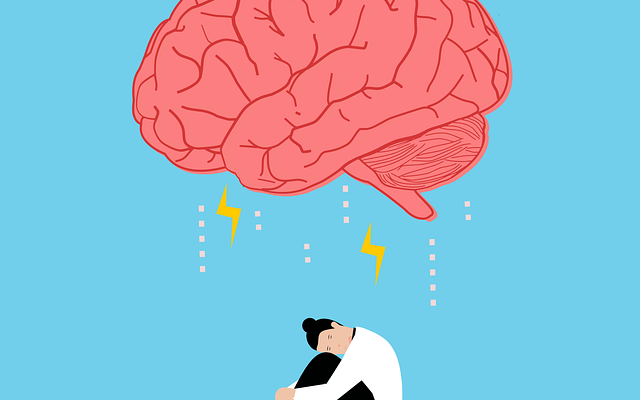How Chronic Stress Affects Your Immune System

If you often feel “sijui aje,” loosely translated to “having an unknown and unexplainable feeling,” when stressed you are not alone in this. It happens to me when I’m going through a high-stress situation; I get stomach upsets, nausea or vomiting, and body weakness. I become sick. This is an indication that chronic stress affects your immune system.
Is that new to you? Have you found yourself in that situation? If you relate, read on, there is quite a bit to discover on how your physiology and immune system respond to chronic stress. We will delve into the details of how chronic stress affects your immune system.
WHAT IS CHRONIC STRESS?
istock photos
We defined stress in my previous article on stress eating. Let’s look into chronic stress today and the biological side of things, your body.
Chronic stress is a physiological (body) and psychological (mind/emotions) response brought about by prolonged exposure to an event/memory/person that causes stress. According to the APA Dictionary of Psychology, you can experience internal and external stressors.
First, when dealing with chronic stress from the definition, there are two aspects to consider; the physiological aspect and the psychological aspect. Both cases speak of the effect of the stress. Second, from the definition, you discover that the causatives are also two. They can be internal, that is, a thought/imagination/memory, or external, that is, an event, person, or movie that could cause or trigger your stress.
SOURCES OF STRESS

Istock photos
Several things can cause stress. Let’s divide them into internal and external stressors.
EXTERNAL STRESSORS
-
Loss
- A source of income – Loss of income is when you lose a job/business/client; in a nutshell, your daily bread. A job offers security for many people in society so, as a result, loss of it means that you aren’t able to pay bills and cater to daily needs; hence, anxiety increases.
- A loved one – Chronic stress can be brought about by grief. The demise of a person you cherish and care for is no mean fit. At times, the sudden nature of the loss, for example, a road accident, is challenging to deal with and process. Other times, the loss after caring for a person for a long time, hoping they will get better, becomes difficult to process due to the unending hope you had. Either way, this can cause chronic stress.
- Heartbreak – You joke about this or call it; character development. However funny this may seem, heartbreak is one of the sources of stress. Consequently, this has caused the direst effects ranging from self-harm to crimes of passion and even a complete behavior change.
How were you after your recent heartbreak? What behavioral patterns did you have that changed over time or that you carried to your next relationship?
-
Strained relationships
Having a rocky relationship with your parent(s), your sibling(s), your spouse, or your closest friend(s) can bring about chronic stress. Constant misunderstandings, quarrels, distance, and closing off are tough to handle and can subsequently grow into chronic stress if you don’t navigate them well.
-
Workplace issues
Undoubtedly, you cannot emphasize this enough. The economy is quite bad, so desperation in job seeking is high. The process of job seeking can be stressful due to rejections, interviews, and lacking funds to go out there, among other things.
In addition to that, a toxic work environment has become a trend. Being overworked, underpaid, having little/no rest, a client-focused approach that ignores the employees’ needs, and emotional and even sexual abuse.
-
Family issues
Some families have to manage chronic illnesses like paralysis, persons with disabilities that need intensive care, and addictions (almost all families have that one ‘uncle/relative’ that cannot control his drug use).
INTERNAL STRESSORS

Getty Images
Memories and thoughts – Things that remind you of a traumatic situation. Some of these things come as intrusive thoughts. Fixation on them can lead to chronic stress and other conditions.
SIGNS AND SYMPTOMS OF CHRONIC STRESS

Getty Images
The body is an intricate scientific organ that sends messages. If you are keen enough, you’ll see/hear them. You may be wondering how chronic stress affects your immune system. Here are some initial signs:
- Fatigue
- Panic Attacks
- General body weakness
- High Blood Pressure
- Stomach Upset/Indigestion
- Diarrhea
- Constipation
- Difficulty in breathing
- Insomnia
- Heartburn
- Ulcers and Hyper-acidity
- Headaches
Which of the physical symptoms have you experienced when you are stressed? Comment below.
All these are physiological problems that are early signs of chronic stress. If not handled well, they can graduate into other severe conditions. Let us explore some of these conditions.
HOW DOES CHRONIC STRESS AFFECT THE IMMUNE SYSTEM?
CARDIOVASCULAR DISEASES

Source: istock
They are diseases that affect your heart. Also known as heart disease.
- Coronary Artery Disease – Stress eating as a coping mechanism may cause this condition.Due to this, fat deposits line the arteries pumping blood in and out of the heart. As a result, it narrows the space where blood flows. In turn, this leads to damage to the vessels.
- High Blood Pressure – Due to high-stress levels, you experience heart palpitations that cause the blood to pump faster and with a lot of pressure resulting in the bursting of the veins
- Cardiac arrest – It is also known as a heart attack. Due to chronic stress or shock, your heart may stop pumping blood suddenly. Essentially, this means that your body organs that need blood to function will be in trouble.
Chronic stress may cause other cardiovascular diseases like; congestive heart failure, arrhythmia, peripheral artery disease, and stroke.
PSYCHIATRIC COMPLICATIONS

Source: Getty
They are disorders that affect your mental, emotional, and psychological well-being.
- Anxiety disorders – Anxiety disorders are excessive worries and fears that interfere with your well-being. Types of anxiety disorders are panic attacks, phobias, and Generalized Anxiety Disorders (GAD).
- Mood disorders, for instance, bipolar disorder and major depression. They bring about drastic emotional changes over time.
- Substance Abuse Disorders – Several addictions come from chronic stress management. Statistics show that alcohol consumption is the most prevalent in Kenya, with 13% of the population drinking alcohol, followed by 11% cigarettes and 6% khat. These are used as coping mechanisms or even for fun in the earlier stages but enslave you in the later years, and now you have to recover from them. What a vicious cycle this is.
PSYCHOSOMATIC ILLNESSES

Image: Istock photos
They are illnesses that bring about unexplainable pains and aches within your physiological system; the physical body and its organs.
- Immune health – This is the ability of the body to fight off diseases. High-stress levels cause the release of cortisol to deal with imbalanced emotions. An influx of cortisol reduces the circulation of antibodies within the human body. In turn, this lowers your immunity.
- Muscle problems – Body weakness is a loss of strength and a sign of chronic stress. Those problems result from poor feeding habits that emanate from loss of appetite owing to pressure. Subsequently, this affects your muscle functions. In addition, muscles become tense when experiencing stress. It occurs as a response to a stressful situation. As a result, you may experience pains and aches in different parts of your body.
- Respiratory Issues – Stress can cause breathing issues like shortness of breath, chest tightening that could block the way you take in oxygen. The causative may be muscle tension in your respiratory tract as a response to stress.
As you can see, chronic stress definitely affects your immune system.
IS STRESS DANGEROUS?
Let me kick back this to you and ask, after reading this article, do you think stress is dangerous?
HOW TO PREVENT EXCESSIVE STRESS

Image: Getty images
What happens when pressure builds up in a pressure cooker? What would happen if you blocked off the systems in place to relieve the pressure regularly? A wise man once said pressure is no pressure if you release it a bit at a time. The same concept applies to stress and chronic stress.
Stressors are natural; how you manage them is something else. That is the difference between you and someone facing stress-related issues. How can you prevent excessive stress?
-
Physical exercise
Exercise helps reduce muscle tension during stressful moments; stretches, yoga, gym, participating in a physical sport, etc, are steps to reducing stress.
- Stop unhealthy coping mechanisms like substance abuse and stress eating. At first, these methods look harmless, but in the long run, the effects are distressing.
- Engage your counselor to equip you with healthy stress management skills. We do it through psycho-education. As a result, you get practical life skills to tackle your day-to-day stressors. Your counselor also helps you process your emotions, patterns, and feelings since some stressors come from your limiting beliefs, among other underlying issues.
- Games and Recreation – They stimulate your mind and release endorphins that counter stress. Mind stimulation enables you to think with clarity; objectively and examine different perceptions and perspectives.
- Relaxation exercises – As you walk with your therapist, they will help you master the art of relaxing, for instance, deep breathing, thus allowing you to manage phobias and anxieties
- Sleeping – Quality sleep is so underrated. When you sleep, you allow your body to rest, recharge and do self-repair. The body has a natural mechanism that enables it to fight antigens, and fix tissues, among other things, when you are asleep.

Image: Getty Images
To conclude, your body sends more messages than you receive. It is paramount to listen to your body even when you are not aware if you are stressed. It will give you the telltale signs to watch out for and do what’s necessary before things get out of hand. As a wise woman once said, you are the CEO of your life, you hire and fire as you please to allow the company (you) to run effectively. We are here for you, to walk this journey and help you relieve the pressure.
It is evident that chronic stress, therefore, affects the immune system.
Are you struggling with intrusive thoughts?
Writer,
Sheila K. Muli










[…] before it escalates. Some shared tips on; how to overcome learned helplessness are in my article on chronic stress. They include physical exercise, games, recreation, facing the issues head-on, setting and […]
[…] my article on how chronic stress affects your immune system, you explore aspects of psychosomatic […]